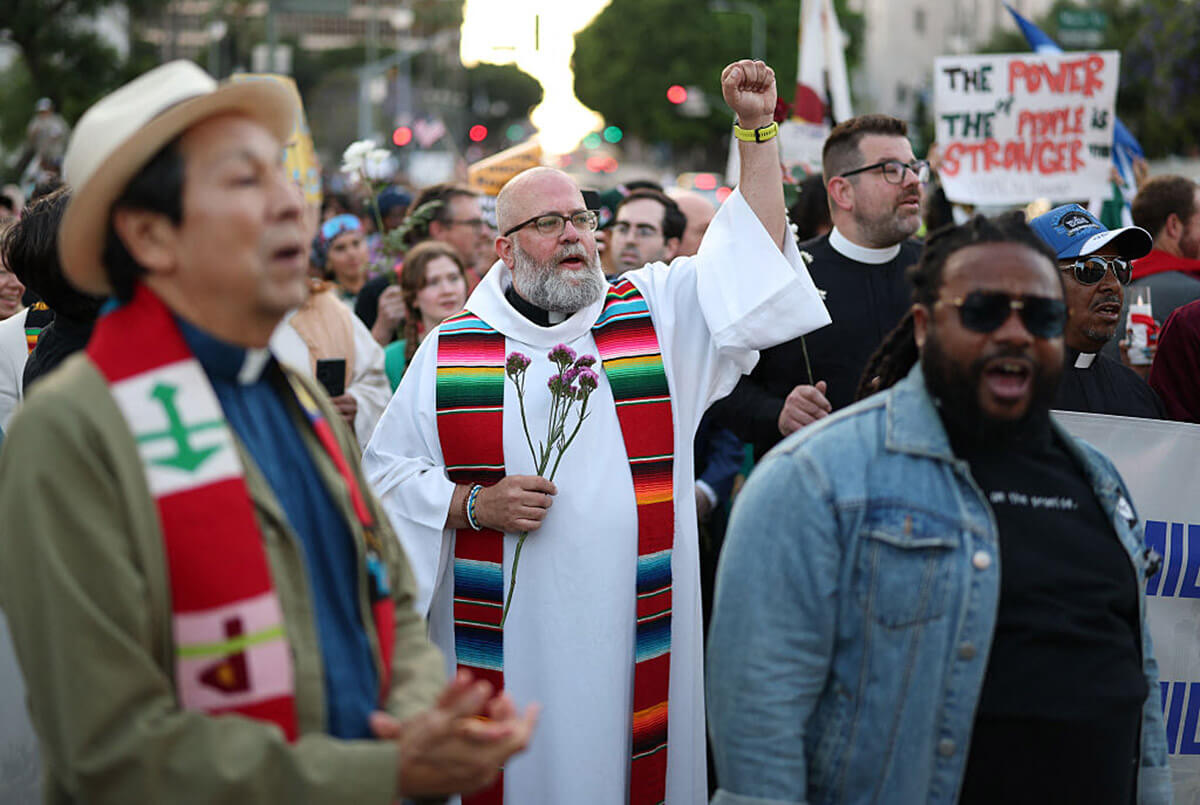Left to right: Speaker of the House Mike Johnson, Rabbi Levi Shemtov and Senate Majority Leader Chuck Schumer light a menorah during a Hanukkah reception at the U.S. Capitol Dec. 17. Photo by Anna Moneymaker/Getty Images
Rabbi Joe Hample has spent years threading the needle: teaching Jewish ethics, challenging injustice, but never telling his congregants how to vote.
Now, as he prepares to retire after 16 years in the pulpit, that line feels blurrier than ever.
“There’s something to be said for maintaining at least the fig leaf of non-partisanship,” said Hample, who leads the Tree of Life in Morgantown, West Virginia — a blue city in a red state.
His restraint — long shared by clergy across faiths — may soon become optional.
This week, the Internal Revenue Service said religious leaders can now endorse political candidates to their congregants without risking their status as a tax-exempt nonprofit. The change was tucked into a joint motion to settle a lawsuit by two Texas churches and a Christian broadcasters’ group. The IRS now says that when a preacher or rabbi speaks to their own members about a political candidate, it’s not campaigning. It’s a “family discussion.”
For some rabbis, the news changes little. “I have never endorsed any candidate from the pulpit or in my formal rabbinic capacity,” said Rabbi Raphael Davidovich of the Orthodox Heights Jewish Center in Cleveland. “The reason didn’t have anything to do with that law. It was simply that I thought it was a bad idea.”
He added: “There’s that line about how, in polite company, you don’t mention religion or politics. So I’m already mentioning religion.”
Rabbi David Wolpe, emeritus rabbi of Sinai Temple, a Conservative congregation in Los Angeles, worries the new rule will invite politics into sacred spaces. “In synagogue I want prayer, not platforms,” he said.
“It is a terrible mistake to encourage religious institutions to become partisan outposts,” Wolpe added. “The Bible is not a party manifesto and God is not a delegate. We are there to hear and succor souls. Can there not be one area of life where the messy, divisive and earthly inciting of politics does not prevail?”
‘God is not a Democrat or a Republican’
Dania Rajendra, a member of Kolot Chayeinu, a progressive synagogue in Brooklyn, said she hopes to see more political clarity from the pulpit.
“I don’t think there’s any such thing as non-political speech and non-political Judaism,” said Rajendra, who recently served on her synagogue’s rabbinic search committee. “I think it’s fundamental to our Jewish values to be actively working for everyone’s freedom, and I look forward to more rabbis speaking out from the bimah and in the streets against the forces that are working against our freedoms.”
She wants rabbis to call out candidates whose messages threaten democratic pluralism. She cited the New York City mayoral race, which has a Muslim candidate, Zohran Mamdani, as the Democratic nominee. “I’m looking for every rabbi in New York City to condemn any candidate who uses Islamophobia, period.”
For Rajendra, the ability of clergy to take public stands alongside other faith leaders isn’t just a political boon — it’s spiritual leadership. “Any opportunity to offer Jewish leadership alongside other faiths in favor of multiethnic, multiracial democracy is good, not just for the Jews, but for everyone.”
But Rabbi Joshua Rabin of Astoria Center of Israel, a Conservative synagogue in Queens where Mamdani is the assemblyperson, said the IRS change won’t affect how he talks about politics from the pulpit.
“God is not a Democrat or a Republican or any political label,” he said. “Clergy are representatives of a spiritual way of looking at the world, and I don’t like the idea of giving anyone the impression that I’m making someone feel that God wants you to take such a clear stance on a single person.”
Davidovich said that even in a politically homogenous community — like in a congregation that may be “99% pro-Trump” — there are always some who differ. “The bottom line is the rabbi wouldn’t want to needlessly upset even 1% of their shul.”
Davidovich said that while he won’t talk about politicians, he said he has no problem talking about political issues. “I want to speak about morality,” he said. “If I want to talk about a certain kind of political corruption that exists, I have no trouble picking one Republican and one Democrat who has violated that moral principle. There’s never been a shortage.”
The bimah and the ballot
Rabbis have long been active in political movements — Abraham Joshua Heschel with civil rights, modern day liberal rabbis protesting immigration raids in Los Angeles — but this marks a change that would allow them to endorse politicians.

Rabbi Jason Holtz, who leads the Reform Temple Kehillat Chaim in suburban Atlanta, has spoken from the pulpit about immigration and abortion. But he’s always drawn the line at endorsing candidates. And the IRS’s new rule won’t change that.
“I worry that if rabbis or other clergy people really start going down this line, it basically doesn’t make us any more than just political hacks,” he said. “And that’s not what I want my rabbinate to be about.”
Still, for some rabbis, the new IRS policy offers a chance to meet the moment with new boldness.
“Now that I’m approaching the end of my rabbinate,” said Hample, 68, who is retiring next year, “and now that we’re in a very stressful political moment for our country, I’m starting to give more political sermons.”


